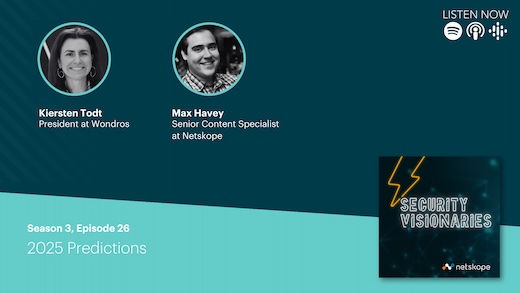During the early days of the COVID-19 pandemic, many government agencies had to move very quickly to enable teleworking to ensure mission consistency during a very unprecedented time.
More than one year later, and it is clear that teleworking in government is likely to remain in 2021, and beyond. Thanks to mandates like Cybersecurity and Infrastructure Security Agency’s (CISA) Trusted Internet Connections (TIC) 3.0 guidance, next-generation teleworking efforts will be enabled by the adoption of Zero Trust security concepts.
In our premiere episode of Navigating Cloud Security: A Netskope Fed Cyber Podcast, the Hon. Phillip J. Bond, President, Potomac International Partners; and Beau Hutto, Vice President, Federal at Netskope, provided a deep-dive discussion into how TIC 3.0 and Zero Trust will advance telehealth for agencies in secure cloud environments.
“Everyone knows that 2020 was a transformative year when it came to government teleworking,” said Bond. “The federal government was already on the path to teleworking, but it was turbo-charged by the pandemic. Today’s there’s more confidence around teleworking, and there has been an increase in productivity.”
When it comes to security around teleworking, the traditional perimeter has essentially been dissolved pointing to the need for Zero Trust. The pandemic also quickly amplified new and innovative collaboration tools for distributed workforces.
“TIC 3.0 is absolutely enabling Zero Trust architectures,” said Hutto. “We must now have traffic flow through a complete security stack that further protects the data, especially when there’s no telling where the user actually is at any given time. This is why you need the right technology that identifies where that user is, and putting controls around the data is critical.”
When it comes to the future of cloud security and teleworking in government, things are moving ahead quickly to where federal leaders fully understand its importance, while agencies are also starting to invest in next-generation data security controls—closer to where the data resides today.
“We have crossed the Rubicon, and it’s full speed ahead now with plenty of oversight,” said Bond. “When we talk to people on Capitol Hill, they all know that security is now more important than ever, and they are aware that security is not simply a moat around on-premise data—it’s all about securing people where they are.”
“With the rapid transition of cloud, where critical mission applications reside along all of the web surfing, agencies must invest in data security solutions that offer ubiquitous controls around all of the data,” added Hutto.
In their final commentary during the podcast both executives echoed the importance of helping the government to evolve its overall security posture, and that “we are all in this together.”




 Voltar
Voltar 





















 Leia o Blog
Leia o Blog